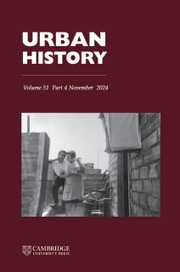Since the emergence of urban history as a sub-discipline in the 1960s, urban historians have recognized the importance of engaging with non-academic communities in order both to disseminate research and respond to contemporary issues of urban life.Footnote 1 The research of the urban historian today is more readily received, to a greater or lesser extent, as a resource in the knowledge exchange between academics and local authority planning departments, employer and trade union bodies, library, museum and heritage organizations and voluntary community groups. They have been active agents in local conservation and preservation groups, consulted on contemporary urban matters that have required an historical perspective and participated in the proceedings of local history and archaeological societies, amongst other areas.Footnote 2 A cursory glance at the list of publications for History & Policy, which has published original research and commentary aimed at policy-makers and journalists since 2002, reveals a number of urban historians providing expert opinion on key areas of urban life and public policy, including those with most apparent overlap such as culture and heritage, as well as in broader spheres including housing, transport, public safety, protest, regeneration and environmental pollution.Footnote 3 Indeed, much of the research that is presented at conferences, and published in Urban History, reflects contemporary issues and questions about urban society, which demonstrates an in-built tendency for urban historians to think beyond the academy to interact with the towns and cities at the heart of their research. There is also a heightened expectation by funding bodies and research councils for academic outputs to have impact beyond the lecture theatre and seminar room. This is most evident in initiatives such as the UK's Research Excellence Framework (REF) and Excellence in Research for Australia (ERA), which emphasize the need to engage with public audiences and participate in novel and interesting ways that help to change behaviour and attitudes, as well as to disseminate knowledge and understanding.
The issue of urban historians’ ongoing potential for impacting on the wider world was raised in the roundtable at the Urban History Group Annual Conference in 2017. Speakers highlighted the need to provide a platform for highlighting both the benefits and challenges of urban historians working in the contemporary city and the knowledge that can be gained from learning from local communities and professionals central to the day-to-day management and shaping of the urban environment.Footnote 4 It was with this in mind that, in May 2018, Shane Ewen and Tosh Warwick organized the ‘Urban history beyond the academy’ workshop at Leeds Beckett University, which was generously supported by the School of Cultural Studies and Humanities, the Centre for Culture and the Arts, and the Urban History New Initiatives Fund.Footnote 5 A broad range of papers were presented across panels on exhibiting and exploring the city, partnership working, place (re)making and the place of history in the present.
We subsequently approached some of the participants to write up their presentations for publication as a special section of Urban History, following the normal editorial process of review and revision. The papers we selected, written by Ph.D. students and early career researchers, reflect the diverse range of topics that were presented at the workshop and demonstrate how pathways to public impact have been designed into the methodology and proposed outcomes of research projects. Each author reflects upon their own work, its relationship with the burgeoning historiography and the value added to their research from working with external partners and communities. We publish them here in the hope that they will be of interest to our readers and encourage us all to collaborate more proactively with non-academic communities in the intention to further our historical and contemporary understanding of urban society in all its forms.



